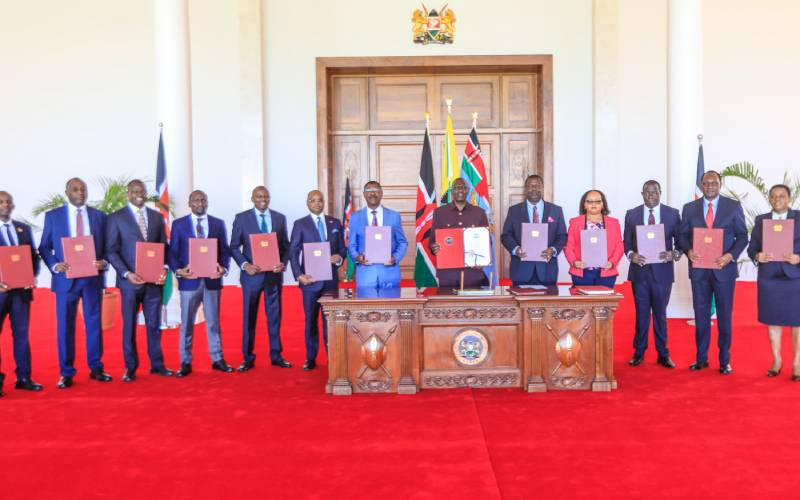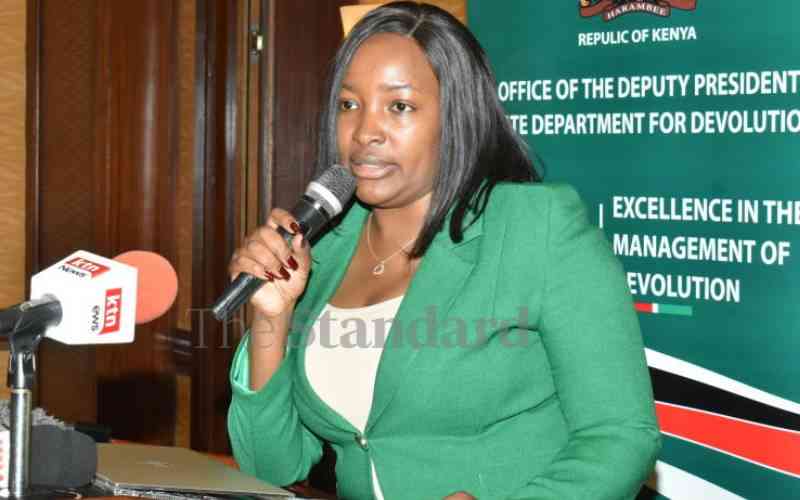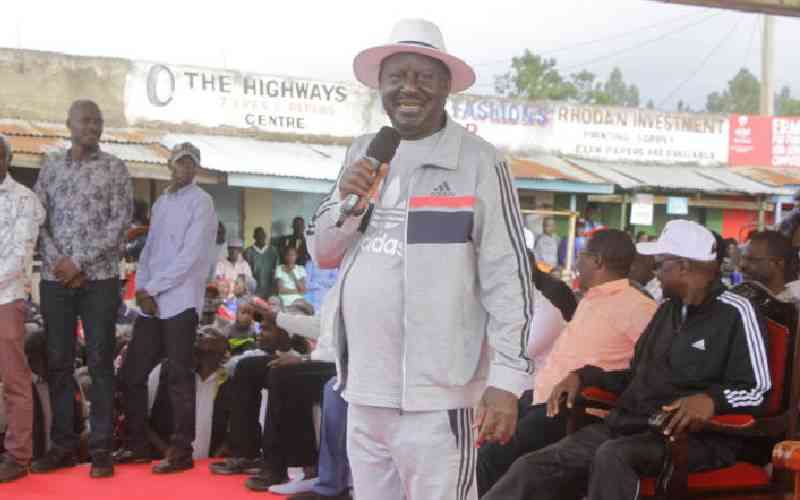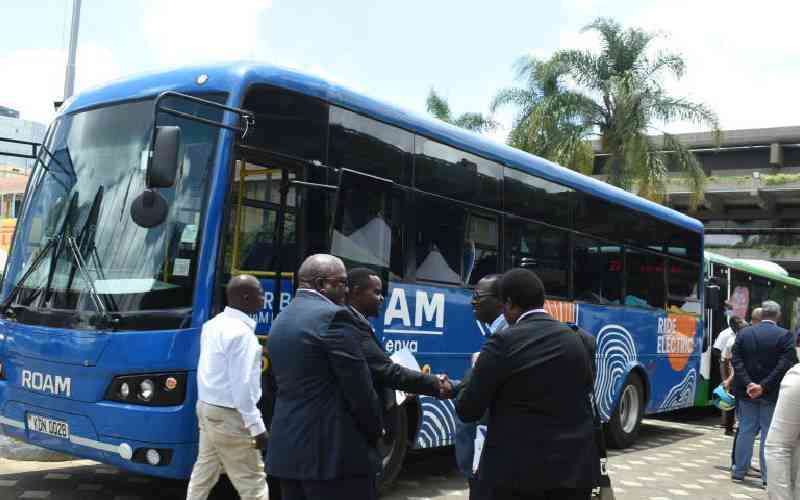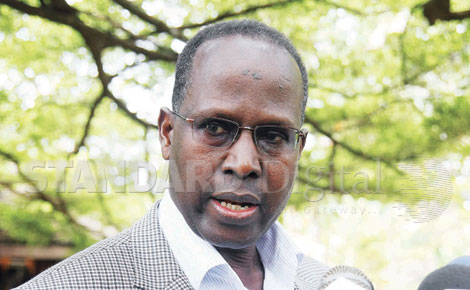 |
|
Commission for Revenue Allocation Chairman Micah Cheserem |
Kakamega Bureau Chief Luke Anami interviewed Chairman of the Commission for Revenue Allocation Micah Cheserem on progress made since devolution was operationalised one year ago. Here are the excerpts.
QUESTION: It is one year since devolution took effect, has it taken root as envisaged in the Constitution?
ANSWER: Yes, it is one year since devolution came into force. However, the Commission for Revenue Allocation was in place two years earlier. It is only a year since both the national and county governments came into existence.
The two governments are still in the process of learning how to operate on their own as well as working side by side. We can say there are many challenges that have emerged but above all, it is good to state that devolution is on its legs now. A lot remains to be done to see it succeed.
QUESTION: What are some of the challenges the county governments are faced with?
ANSWER: The first major challenge has been the release of funds. The process has been very slow. For instance, the first batch of funds released to the counties was in September 2013. You can see this year, the funds were released in January. Late release of funds makes it difficult for the counties to plan, budget and execute their plans.
However, I am not blaming anybody for the late release of funds. You are aware that the process of establishing the two governments took some time after the elections and the budgets had to be rushed. So the process was somehow affected.
The second challenge has been the use of Integrated Financial Management Information System (IFMIS). IFMIS is used to distribute funds to the county governments. For it to operate, it requires Internet connectivity. While some counties like Nairobi have fibre optic, majority others do not have. Places with low connectivity such as Mandera, Wajir and even Vihiga, whose officials for some time had to travel to Kisumu to access IFMIS, are affected.
Apart from counties which inherited infrastructure from the former Local Government authorities, there are counties that did not have offices in place by June last year. Lack of infrastructure is partly to blame for the poor use of IFMIS.
Thirdly, most counties lack the skills to use IFMIS. Most counties lack trained and skilled professionals in IT that can operate the system. We are in discussion with the Treasury and soon we will be training personnel in counties on how to use the system.
Of course there are challenges with the national government. Governors are in battles with MPs and senators. There is need for all arms of the Government to work together. Remember the analogy I gave of an airplane, the pilot and the passengers? Whatever we do we must ensure that devolution succeeds because that is what the people of Kenya wanted.
QUESTION: There has been disconnect between the Executive, governors, senators, Members of the County Assembly (MCAs) and even the public. We have seen public disagreements over who should fly the flag, MPs and MCAs want more pay and other power struggles in the past one year. Are the fights going to kill devolution?
ANSWER: Indeed there are many disagreements between the Executive, the senators and the governors. But I want to be specific on the governors and the senators.
In my opinion, both governors and senators should exercise diplomacy in their dealings. Why am I saying so? Governors know very well that senators participate in distribution of revenue from the national government to the counties yet they appear to be quarrelling over the mandate of the senators. The senators are expected to protect the counties as per the Constitution.
Senators participate in the Division Revenue Bill. If the senators are going to be involved, then the governors have a right to be involved as well. So cordial relations between the two must always be maintained. It is a pity that they appear to be fighting when they should not be.
Stay informed. Subscribe to our newsletter
I am not apportioning blame but governors and senators must be like Siamese twins. For this country, and to a larger extent devolution to succeed, the other national institutions too must work in harmony. We have no choice but to work together.
The debates over the flags are diversionary. We should instead engage in debate for development and not on who is more powerful.
QUESTION: What are some of the lessons learnt since devolution was operationalised?
ANSWER: If there is one lesson that we have learnt is that institutions must work in harmony. The President, the governors, Senate, MPs, Judiciary, MCAs, the civil society and the public must work in harmony for the sake of our future generations. Each of them swore to protect the Constitution and on that each will be held accountable.
The other lesson is that Rome was not built in a day. It is only a year since devolution came into place and I hear many people criticising governors, others want the Senate scrapped, others want more money, others are saying devolution is expensive.
Nothing is cheap. One year of devolution is not enough period to judge whether it is working, or whether it will succeed or not.
We have also learnt that the public do not understand devolution. We missed out on giving civic education and that has affected the way the public perceives devolution. Those who are responsible for civic education failed us. If the public had understood that they must participate they could have supported devolution.
Unfortunately, the public feel the governors just want to ride in big cars and convoys while the good work by the counties is hardly felt by the locals. The requirement that the public participate in the decision making process at the county levels makes it mandatory that we have no choice but to carry out civic education so that there is effective public participation.
QUESTION: There has been clamour for more pay especially by the MCAs and MPs want more CDF funds plus more pay while the President is taking a 20 per cent pay cut because the wage bill is too high. Any suggestions on the way forward?
ANSWER: First and foremost, the issue of MCAs’ remuneration; why can’t it be solved once and for all? The MCAs should have formed a special team to meet the Salaries and Remuneration Commission so as to allow the smooth operations of the counties. MPs should not ask for more money. In fact they should not earn sitting allowances as they are already paid to do so. We need a sober debate over the whole issue of pay.
On the wage bill, the sad part of it is that provincial administration should have been restructured to avoid duplication of duties. That is the starting point if anyone wants to reduce the wage bill.
Wage cuts alone will not be able to solve the problem. I proposed a comprehensive approach to the whole issue of the wage bill.
 The Standard Group Plc is a
multi-media organization with investments in media platforms spanning newspaper
print operations, television, radio broadcasting, digital and online services. The
Standard Group is recognized as a leading multi-media house in Kenya with a key
influence in matters of national and international interest.
The Standard Group Plc is a
multi-media organization with investments in media platforms spanning newspaper
print operations, television, radio broadcasting, digital and online services. The
Standard Group is recognized as a leading multi-media house in Kenya with a key
influence in matters of national and international interest.
 The Standard Group Plc is a
multi-media organization with investments in media platforms spanning newspaper
print operations, television, radio broadcasting, digital and online services. The
Standard Group is recognized as a leading multi-media house in Kenya with a key
influence in matters of national and international interest.
The Standard Group Plc is a
multi-media organization with investments in media platforms spanning newspaper
print operations, television, radio broadcasting, digital and online services. The
Standard Group is recognized as a leading multi-media house in Kenya with a key
influence in matters of national and international interest.


